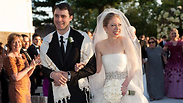
'Rabbi Ponet marries mixed couples with a heavy heart, but out of a sense of mission'
Photo: AP

Prof. Yossi Shain
Photo: Amit Magal
Yale University announced recently that Rabbi James Ponet was retiring after 32 years as the university's Jewish chaplain. Allegedly, this is a marginal and local event, but not when it involved Rabbi Ponet, one of the most outstanding figures in American Jewry. His spirit and work have changed the Jewish experience in Yale's important campus, where he founded the Joseph Slifka Center for Jewish Life, which has become a role model in the United States.
Rabbi Ponet says that the students at Yale are enjoying a valuable opportunity to look into the possibility of living their lives according to traditional norms. He says they are given the chance to reflect on what turns a home into a Jewish home and a family into a Jewish family, on the vision Judaism offers and the way it presents for a proper life.
Until the 1960s, Yale University had restricted the entry of Jewish students and faculty, like other elite institutions in the US. Rabbi Ponet led the Jews and Judaism from the hidden margins of the campus to the heart of university life. On Shabbat, several houses of prayer are held at the same time at the Slifka Center for Reform, Orthodox, Chabadnik and haredi students. Israelis, complete seculars, melt at the sight of Jewish students encircling the campus singing with Torah scrolls on Simchat Torah.
2nd Generation
First study of its kind released by Israeli American Council finds 17% of children of Israeli Jews who have lived in America for over decade have married non-Jews, compared to 8% in parents’ generation
These are important issues for the young Jews of America, 60% of whom are expected to enter mixed marriages. In 1960, for the sake of comparison, only 20% were in mixed marriages.
And here, in Israel of all places, Rabbi Ponet has turned from a role model into the target of Rabbi David Stav of the Tzohar rabbinical organization, allegedly the moderate side of Orthodox Judaism. Rabbi Stav lashed out at Rabbi Ponet for daring to unite Chelsea Clinton, the daughter of President Bill Clinton and former Secretary of State Hillary Clinton, in marriage with her Jewish fiancé Marc Mezvinsky. "You want me to recognize Chelsea Clinton's child as Jewish? You want me to recognize the rabbi who married her as Jewish?" Rabbi Stav said angrily in a meeting with US rabbis.
With all due respect to Rabbi Stav, Rabbi Ponet does not need his permit. He is my rabbi. He is the one who welcomed me into his home on Shabbat and Jewish holidays, woke me up in the mornings to study Jewish philosophy and Talmud, performed my wedding ceremony and even conducted my son's circumcision ceremony in his house.
Rabbi Ponet lived in Jerusalem for years and even served in the army. Long before the Taglit project was established, he had already brought high school students from the United States to Jerusalem to teach them the love of Israel. Ponet was also an associate of late Rabbi David Hartman, who built a modern Orthodox community in Israel. After returning to the United States in 1981 to build the Yale Jewry, Rabbi Ponet worked quietly to liberate Soviet Jews, and he is credited for many other good deeds.
In recent years, Rabbi Ponet realized that the challenge of mixed marriages must be answered with a creative and brave Jewish response, not just condemnation. Figures show that since 2000, more than half of children born to Jews in America are born to mixed couples.
Rabbi Ponet has decided to work to ensure that young people who have chosen non-Jewish partners will not give up on their heritage as well. He believes that Judaism is dynamic and that we must nurture it even in situations when not everyone is Jewish. He marries mixed couples with a heavy heart, but out of a sense of mission and faith that everything must be done in order to keep the Jews. Indeed, new studies show that when the Jewish parent in the mixed marriage maintains his or her affiliation with Judaism, the children see themselves as Jews.
Mixed marriages will continue to engage us in the future, and there are good reasons for those who are against rabbis' participation in such ceremonies. But instead of cursing and boycotting Rabbi Ponet, we must enter a serious dialogue with the US Jewry.















